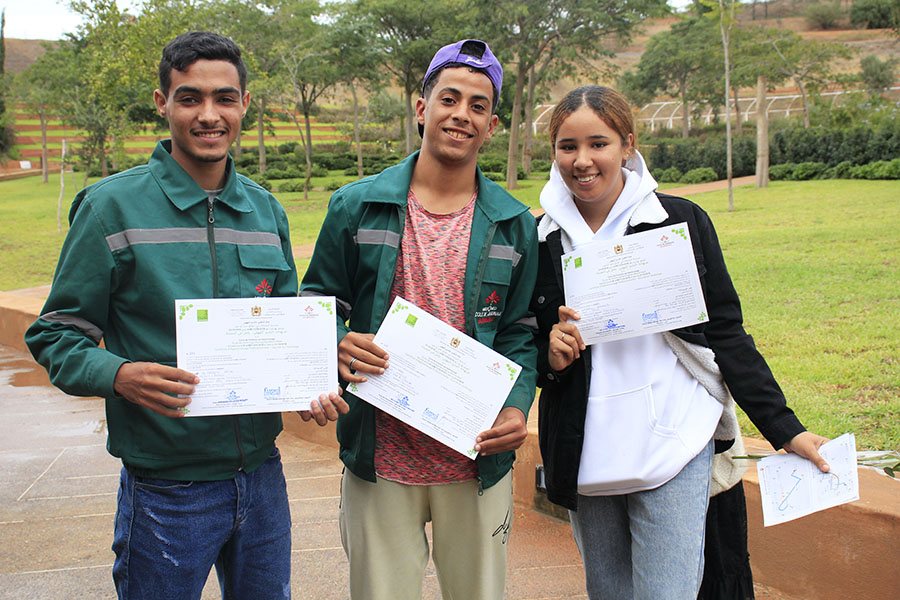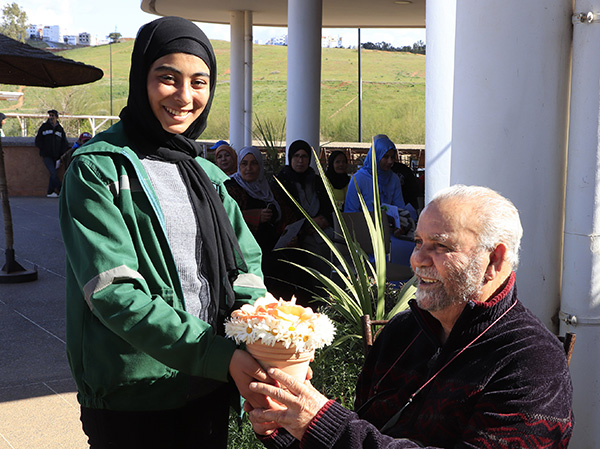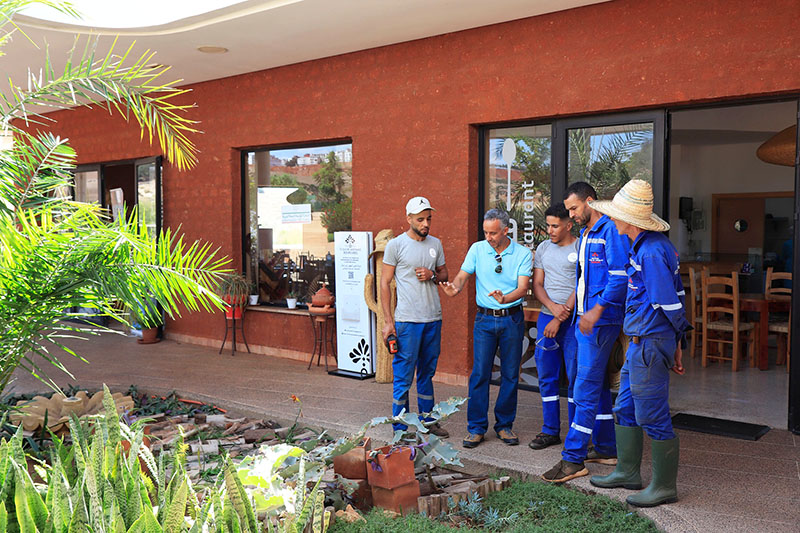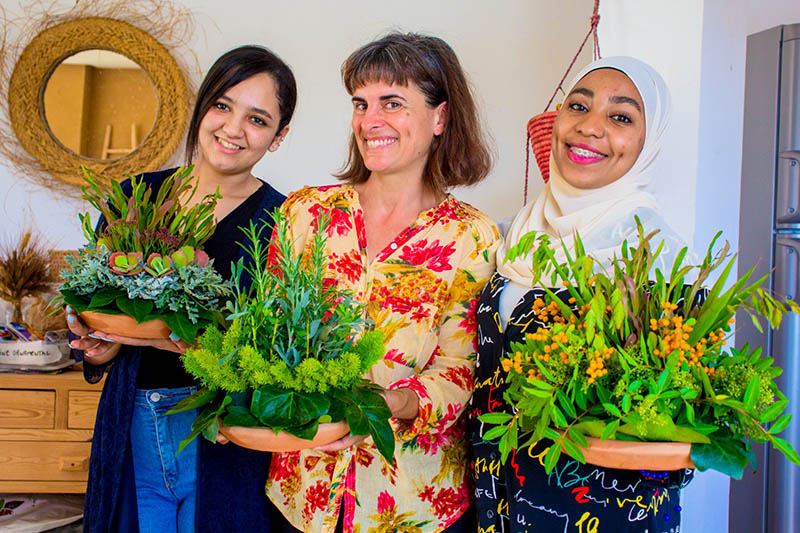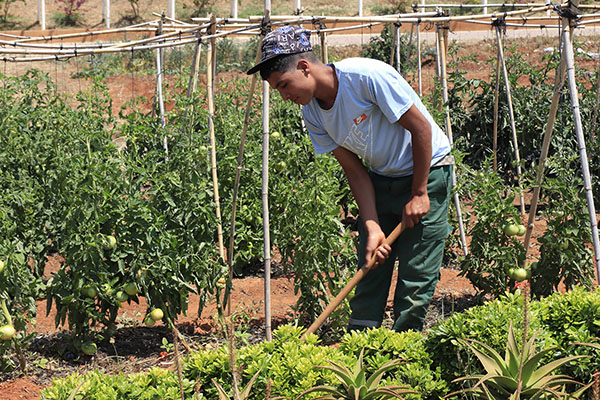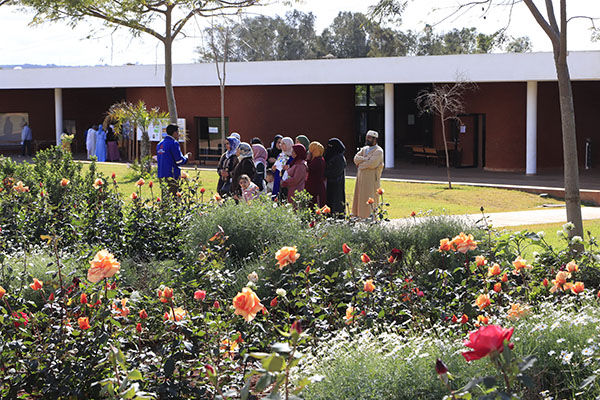The Med-O-Med Gardening School, located in Salé, Morocco, was recently inaugurated for the 2023-2024 academic year, in its sixth year. A qualified vocational training project with a social, environmental and cultural character conceived by our president Cherif Abderrahman Jah, with the aim of providing young people in difficult situations with sufficient skills to become qualified gardeners and to reach the labour market with the dignity that this beautiful profession deserves.
After the summer months, during which a large number of the apprentices have done their paid gardening internships as a means of familiarising themselves with the work environment, classes have begun, and with them, some of the long-awaited rain. Girls and boys, many of them new, bustle about the school and the park – albeit in relative order and concert – taking turns between theory classes – 20 per cent of the teaching – and practical classes. From time to time there are loud bursts of applause, mostly from Class 1, the result of the enthusiasm that Professor Mustapha and his assistant Abdellatif (a former pupil) know how to instil in the newcomers.
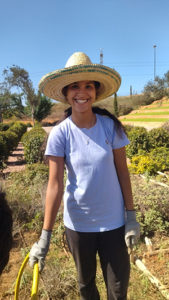 This year, the young girls are legion, and several apprentices have entered directly into the second course, in what is known here as the “passerelle”, for those with a basic knowledge of the subject. The training is dispensed over three years, with three different recognitions endorsed by the Moroccan Ministry of Employment. The first is the Vocational Training Certificate, the second is the Specialisation Diploma, and the third is the Qualification Diploma.
This year, the young girls are legion, and several apprentices have entered directly into the second course, in what is known here as the “passerelle”, for those with a basic knowledge of the subject. The training is dispensed over three years, with three different recognitions endorsed by the Moroccan Ministry of Employment. The first is the Vocational Training Certificate, the second is the Specialisation Diploma, and the third is the Qualification Diploma.
While the school started with a majority of Spanish trainers – specialised training in gardening is very scarce in Morocco -, today the majority of Moroccan personnel trained at the school are Spanish, thus responding to the demand for knowledge transfer inherent in the project from the beginning, as is the case with any cooperation project, in this case, Spanish-Moroccan.
This year the young girls are legion, and there are several apprentices who have entered directly into the second year, in the form of what is known here as a “passerelle”, for those with a grounding in the subject.
One of the keys to success has been the incorporation from the 2021-2022 academic year of several former students who work at the school as gardening assistants and who are receiving more and more training. Also, the arrival of a new pedagogical coordinator, Mohamed Rami, with extensive experience in cooperation projects in Spain, Morocco and Latin America in gardening. In addition, the regular presence of the Pedagogical Advisor, author of the training programme, Alberto Juan y Seva, from the University of Seville, has been fundamental in consolidating and increasing the level of teaching, with a view to the ever necessary improvement.
Awareness raising and income-generating activities
On the other hand, during this past academic year 2022-2023, in addition to training, the school has increased its awareness-raising and income-generating activities. It should not be forgotten that this is a centre not only dedicated to teaching, but also to raising environmental and cultural awareness, and open to the public. Lectures such as the one given by the islamologist Asma Lamrabet on the medieval mystic Rabi’a al-Adawiya, or by Professor Farid El Asri, President of the Centre for Global Studies at the International University of Rabat, on the perception of Islam in Europe, were very well received. Also, we had the pleasure of presenting the book “Mon chemin vers les sept sommets du monde”, of the alpinist Bouchra Baibanou, an insparing woman which is also deeply involved in association work.
On the other hand, during this past academic year 2022-2023, in addition to training, the school has increased its awareness-raising and income-generating activities.
In relation to income-generating activities, the school has increased its proposal, which, however, is expected to increase significantly during the new school year.
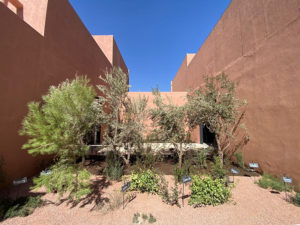 Thus, the production nursery is making headway and, among other actions, has sold a large number of endemic and indigenous Moroccan plants for landscaping at the International University of Rabat and for the gardens surrounding the permanent Moroccan pavilion in Marrakech, built on the occasion of the annual meetings of the IMF and the World Bank. This permanent building was designed with ecological and natural materials by the prestigious Oualalou + Choi agency, while the gardens were designed by PAN Landscape Architecture, one of the school’s best clients and partners.
Thus, the production nursery is making headway and, among other actions, has sold a large number of endemic and indigenous Moroccan plants for landscaping at the International University of Rabat and for the gardens surrounding the permanent Moroccan pavilion in Marrakech, built on the occasion of the annual meetings of the IMF and the World Bank. This permanent building was designed with ecological and natural materials by the prestigious Oualalou + Choi agency, while the gardens were designed by PAN Landscape Architecture, one of the school’s best clients and partners.
Likewise, the fruits and seedlings from the winter garden, and later the summer garden, were timidly sold this last spring and summer because of their quality (we obtained up to 9 varieties of tomatoes!). This year, another objective is to systematise the sale of ornamental and food plants and seedlings in the school itself, at weekends and during the markets organised in the school, which will also allow the apprentices to earn some money and become familiar with the commercial activity as part of their training. In that sense, we were recently present with our production in the Diplomatic Bazar of Rabat.
Also, in addition to the usual school visits, which are accompanied by workshops organised by the school’s monitors and other educational organisations, we have held our first courses for professionals in the sector, as a way of replicating and disseminating our training model.
The school has also made its first “dabbling” in the amphitheatre, which had remained with hardly any activity during these years of crisis, offering various open-air shows for the public, in a magical atmosphere, accompanied by the silent fall of the night and the croaking of the storks.
News of mourning
The summer, however, was a difficult one. We had the sad news of the unexpected death of our beloved technitian Aziz Chikhi and, shortly after, the terrible earthquake in the province of Haouz, especially in the High Atlas. The first impulse was to go to the field and help, an impulse that we soon discarded (there will be many stages in which the school could be useful), due to the difficult situation on the ground and the hindrance that spontaneous people were causing to humanitarian aid.
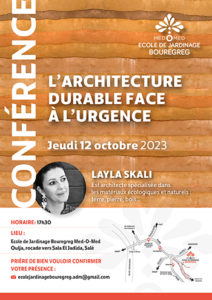 One month later, among many other things, the construction of sustainable and at the same time survivor-friendly habitats in the face of the harsh winter that was to come was a must. The school’s modest contribution was to invite Layla Skali, an architect specialising in ecological construction, and Luis Arleo, a Venezuelan expert in adobe construction and emergency situations, who led a lively debate on the question: “Sustainable construction in the face of emergency”. Architects and engineers shared their experiences and opinions on this pressing issue.
One month later, among many other things, the construction of sustainable and at the same time survivor-friendly habitats in the face of the harsh winter that was to come was a must. The school’s modest contribution was to invite Layla Skali, an architect specialising in ecological construction, and Luis Arleo, a Venezuelan expert in adobe construction and emergency situations, who led a lively debate on the question: “Sustainable construction in the face of emergency”. Architects and engineers shared their experiences and opinions on this pressing issue.
Challenges and objectives
For this new school year, the objectives and challenges are new, following an exercise in self-criticism and evaluation. Among them is precisely the increase of income-generating activities, as a means to the gradual self-sufficiency of the project. This will be done by outsourcing them to professionals in this field, through the provision of services. A communication strategy has also been launched to increase the already extensive knowledge of the project and to disseminate its many activities and services to the public.
On the other hand, the great challenge for the school is to avoid school drop-out – three years of training are sometimes difficult for apprentices in difficult family and economic situations – as well as to improve the quantity and quality of integration, which is already generally satisfactory in itself.
In terms of vocational integration, the good news is the creation of a platform for vocational integration, set up by the INDH (National Initiative for Human Development), an outstanding state institution and one of the main partners in the project.
To this end, it is necessary to implement the system of small stipends for outside work during the training period, as well as paid summer internships. It is also necessary to increase the number of skills modules for the future employability of the apprentices and to consider almost the entire third year as an external job in a professional environment.
It is also necessary to raise awareness among families, as we did last spring in a fun and enjoyable day dedicated to them. And this, so that they understand the value of qualified studies that allow their sons and daughters access to the decent and formal labour market, even if it is far from their homes. A task, that of influencing mentalities, which we do not only with relatives, but also with potential clients, who have to understand that, after three years of quality studies, these young people are amply prepared to carry out jobs that are valued and remunerated above the average.
Furthermore, the assiduous presence of the pedagogical advisor, author of the training programme, Alberto Juan y Seva, from the University of Seville, has been fundamental in consolidating and increasing the level of teaching, with a view to the ever-necessary improvement.
In terms of professional integration, the good news is the creation of a platform for professional integration, set up by the INDH (National Initiative for Human Development), an extraordinary state institution and one of the main partners of the project. To this end, the INDH Salé will soon be convening all the school’s graduates in order to bring them together and discuss with them, especially with those who still have some difficulty in finding a job in line with their skills, how to integrate them into the labour market, through guidance and financial assistance to carry out their projects and realise the dreams to which they are entitled.
International recognition has come among others to the project, winning the second prize “Green Skills Award 2023”, awarded by the European Training Foundation, which belongs to the European Union. It was chosen from among 10 finalists out of 600 projects from 60 countries by a jury of international training specialists.
The ETF Green Skills Award is a global initiative launched in 2021. It provides insights and inspiration from around the world on innovation that happens through people and institutions. The initiative has become a source of best practice that can inspire people across the globe to make real change by creating circular and carbon neutral economies and societies.
This post is available in: English Español

